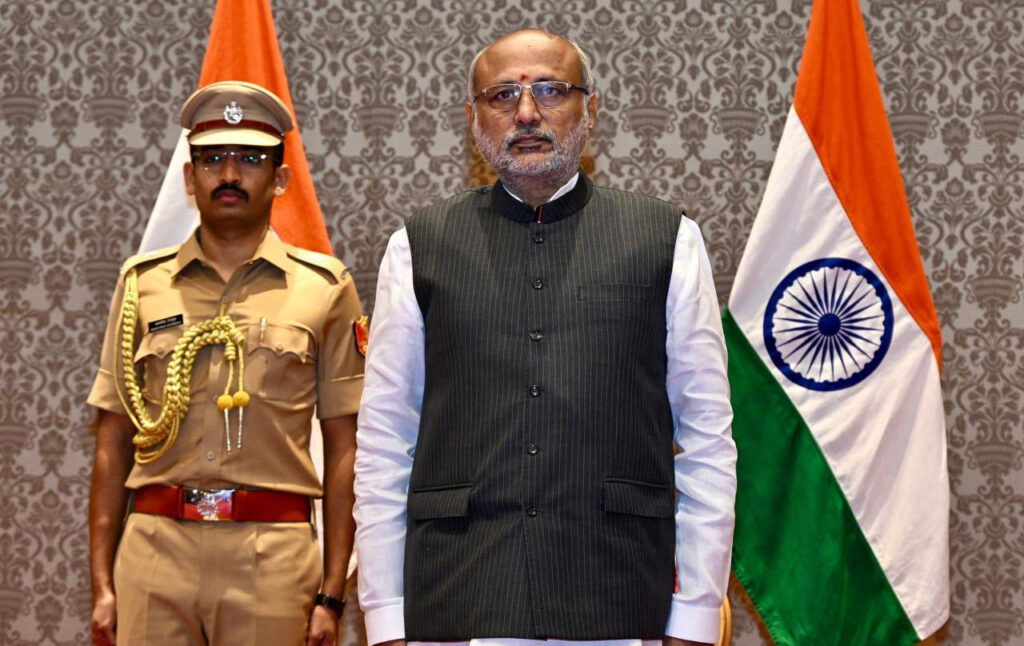The National Democratic Alliance (NDA) on Sunday announced that Maharashtra Governor CP Radhakrishnan will be its candidate for the upcoming Vice-Presidential election. The election is scheduled to be held on September 9.
A veteran BJP leader from Tamil Nadu, Chandrapuram Ponnusamy Radhakrishnan has had a long career in politics, marked by his association with the Rashtriya Swayamsevak Sangh (RSS) and various leadership roles within the BJP. He is a seasoned political leader with decades of experience in parliamentary politics, state leadership, and constitutional offices.
Radhakrishnan was born in Tiruppur, then part of Madras State (now Tamil Nadu), in October 1957. From the age of 16, he became involved with the RSS and the Jan Sangh. In 1974, he became a member of the Bharatiya Jana Sangh’s state executive, laying the foundation for his long association with the Sangh Parivar and the Bharatiya Janata Party (BJP).
His major breakthrough in national politics came in 1998 when he was elected as a Member of Parliament from Coimbatore, a victory by over 150000 votes made significant by the fact that it came soon after the Coimbatore bombings. He won again in 1999, defeating a DMK candidate.
In Parliament, Radhakrishnan served as Chairman of the Standing Committee on Textiles and as a member of committees on Public Sector Undertakings, Finance, and the Stock Exchange Scam inquiry. He also represented India at the United Nations General Assembly in 2003, addressing issues of humanitarian coordination and disaster relief. In 2004, he was part of India’s first parliamentary delegation to Taiwan.
Radhakrishnan was appointed as the President of the BJP’s Tamil Nadu unit in 2004, and he remained in the position till 2007. During this period, he organized a 93-day, 19,000 km Ratha Yatra to advocate for interlinking rivers, fighting untouchability, countering terrorism, and pressing for a Uniform Civil Code.
He later conducted two more padyatras, cementing his image as a leader who could connect with grassroots issues. His organizational skills and ideological clarity helped strengthen the BJP’s presence in Tamil Nadu, a state where the party has historically faced challenges.
He contested Lok Sabha elections in 2014 and 2019, but was unsuccessful. Between 2020 and 2022, he was the BJP’s in-charge for Kerala. Radhakrishnan was also appointed Chairman of the Coir Board in 2016, where he oversaw record exports worth ₹2,532 crore during his tenure.
In 2023, Radhakrishnan was appointed Governor of Jharkhand. He earned praise for visiting all 24 districts of the state within four months and engaging directly with citizens. Later, he was also given additional charges as Governor of Telangana and Lieutenant Governor of Puducherry. In July 2024, he was sworn in as the Governor of Maharashtra.
If the opposition fields a candidate, CP Radhakrishnan is almost certain to win the polls and become the next vice president of India.
The Vice President of India is elected by an electoral college consisting of members of both Houses of Parliament, Lok Sabha and Rajya Sabha. Unlike the Presidential election, state assemblies are not part of this process. Currently, the BJP-led National Democratic Alliance (NDA) enjoys a comfortable majority in the Lok Sabha and has significant strength in the Rajya Sabha, even though it does not have an outright majority in the Upper House. Taken together, the NDA’s numbers in both the Houses place its candidate in a strong position.
The only real challenge to Radhakrishnan’s chances lies in whether the opposition can present a united candidate and mobilise all its MPs. In recent years, opposition parties have struggled to maintain cohesion, particularly in contests for constitutional posts. Even if the opposition fields a candidate, the numerical arithmetic in Parliament Favors the NDA.
By choosing Radhakrishnan, a leader from Tamil Nadu, the BJP has signalled its intention to strengthen its presence in southern India, where the party is still trying to expand.

